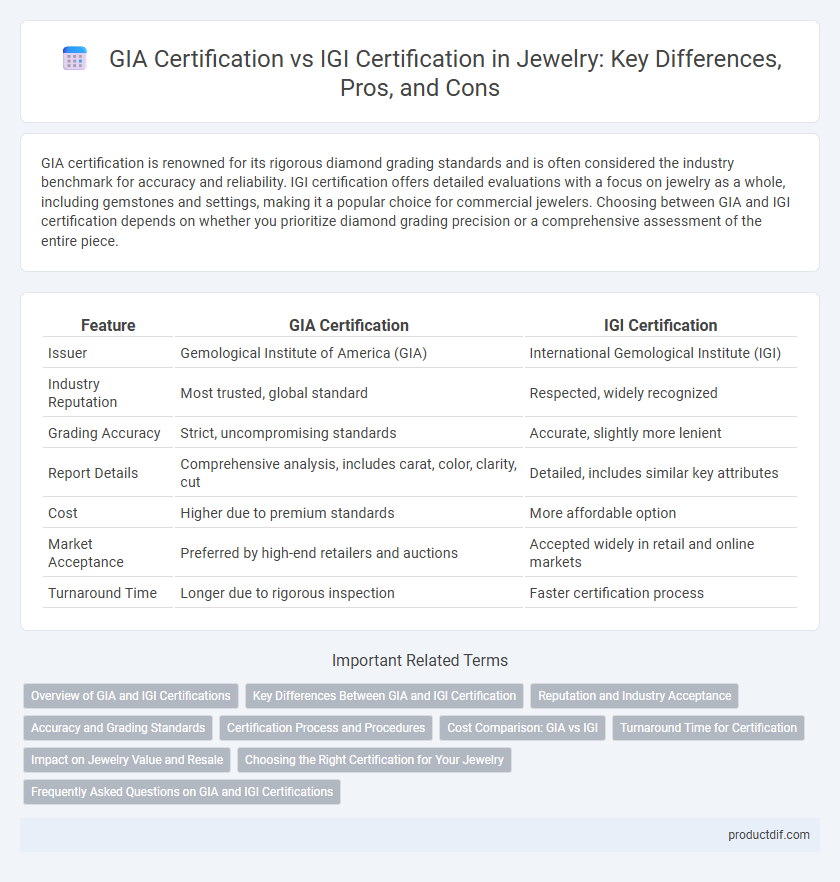GIA certification is renowned for its rigorous diamond grading standards and is often considered the industry benchmark for accuracy and reliability. IGI certification offers detailed evaluations with a focus on jewelry as a whole, including gemstones and settings, making it a popular choice for commercial jewelers. Choosing between GIA and IGI certification depends on whether you prioritize diamond grading precision or a comprehensive assessment of the entire piece.
Table of Comparison
| Feature | GIA Certification | IGI Certification |
|---|---|---|
| Issuer | Gemological Institute of America (GIA) | International Gemological Institute (IGI) |
| Industry Reputation | Most trusted, global standard | Respected, widely recognized |
| Grading Accuracy | Strict, uncompromising standards | Accurate, slightly more lenient |
| Report Details | Comprehensive analysis, includes carat, color, clarity, cut | Detailed, includes similar key attributes |
| Cost | Higher due to premium standards | More affordable option |
| Market Acceptance | Preferred by high-end retailers and auctions | Accepted widely in retail and online markets |
| Turnaround Time | Longer due to rigorous inspection | Faster certification process |
Overview of GIA and IGI Certifications
GIA Certification is widely recognized for its strict grading standards and is considered the industry benchmark for diamond quality assessment, providing detailed reports on cut, color, clarity, and carat weight. IGI Certification offers comprehensive gemological analysis with an emphasis on international standards, often preferred for colored gemstones and jewelry pieces in global markets. Both certifications enhance buyer confidence by ensuring authenticity and quality, but GIA's reputation for consistent accuracy often leads to higher resale value.
Key Differences Between GIA and IGI Certification
GIA certification is recognized globally for its strict grading standards and comprehensive diamond reports, ensuring high accuracy in assessing carat, color, clarity, and cut. IGI certification offers detailed evaluations with a focus on affordability and accessibility, often appealing to wholesale and retail markets. The key differences include GIA's emphasis on industry-leading expertise and universally accepted grading versus IGI's broader certification options and competitive pricing.
Reputation and Industry Acceptance
GIA Certification holds the highest reputation in the jewelry industry, widely recognized for its rigorous grading standards and reliability among retailers and consumers. IGI Certification, while respected, is often considered less stringent, with its reports primarily valued in international markets and for fashion jewelry. Jewelers and buyers typically prefer GIA-certified diamonds for investment and resale due to its superior industry acceptance and trustworthiness.
Accuracy and Grading Standards
GIA certification is renowned for its strict grading standards and highly accurate assessment of diamonds, using standardized protocols that ensure consistent and reliable results. IGI certification, while widely respected, employs grading practices that can be more lenient, often resulting in slightly higher grades for certain diamond qualities. Accuracy in GIA reports is considered the industry benchmark, making it the preferred choice for buyers seeking the most precise evaluation of diamond characteristics.
Certification Process and Procedures
GIA Certification involves a rigorous grading process based on standardized criteria including clarity, color, cut, and carat weight, performed under strict laboratory conditions by expert gemologists, ensuring consistent and reliable diamond evaluations. IGI Certification also follows a comprehensive examination with advanced equipment and multiple assessments but is internationally recognized for its focus on aesthetics and jewelry identification alongside diamond grading. Both certifications utilize microscopic analysis and laser inscription verification; however, GIA emphasizes strict grading integrity, whereas IGI offers detailed jewelry appraisals, impacting the perceived value and resale potential of certified gemstones.
Cost Comparison: GIA vs IGI
GIA certification generally costs more than IGI certification due to its strict grading standards and global recognition, with prices for a standard diamond report starting around $100 to $150 for GIA compared to $50 to $100 for IGI. The higher cost of GIA certification reflects its reputation for accuracy and reliability, often leading to higher resale value and consumer trust. IGI certification offers a more affordable option without compromising basic grading quality, making it popular for budget-conscious buyers and fashion jewelry.
Turnaround Time for Certification
GIA certification typically offers a faster turnaround time, with most reports delivered within 7 to 10 business days, ensuring quick verification for buyers and sellers. IGI certification generally takes longer, often ranging from 10 to 15 business days due to detailed analysis and comprehensive grading processes. Choosing between GIA and IGI certification depends on the urgency of certification needs and the desired level of assessment detail.
Impact on Jewelry Value and Resale
GIA certification is widely recognized for its strict grading standards, often resulting in higher resale values and greater buyer trust in the jewelry market. IGI certification, while reputable, may sometimes be perceived as less rigorous, potentially affecting the appraisal and resale price of diamonds and gemstones. Jewelers and buyers prioritize GIA certification to ensure premium value retention and transparent quality verification.
Choosing the Right Certification for Your Jewelry
GIA certification is widely recognized for its strict grading standards and unbiased evaluation, making it a preferred choice for investment-grade diamonds. IGI certification offers detailed descriptions and is often favored for fashion jewelry due to its comprehensive reports and accessibility. Selecting the right certification depends on your jewelry's purpose, value, and market expectations, with GIA preferred for resale value and IGI suitable for everyday wear pieces.
Frequently Asked Questions on GIA and IGI Certifications
GIA Certification is renowned for its strict grading standards and widely recognized diamond reports, making it a preferred choice for buyers seeking trusted quality verification. IGI Certification offers comprehensive grading services with a strong presence in international markets and is often chosen for jewelry collections featuring lab-grown diamonds. Common questions include differences in grading accuracy, market acceptance, and whether the certification impacts resale value, with GIA generally favored for higher market credibility.
GIA Certification vs IGI Certification Infographic

 productdif.com
productdif.com